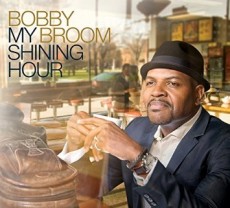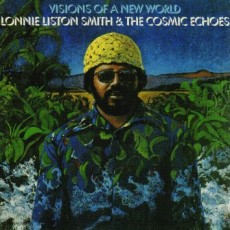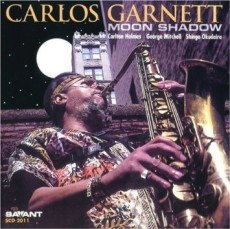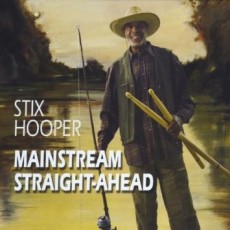
Daily Dose Of Jazz…
Bobby Broom was born Robert Broom Jr. on January 18, 1961 in New York City and began studying the guitar at age 12, taking lessons in the American Folk music style. A year later, he studied with jazz guitarist Jimmy Carter in Harlem where he took weekly lessons for the next two years.
His interest in jazz began in earnest at age 15 and as a result he began his research, study and practice of the jazz art. Broom attended the Laguardia High School of Performing Arts where he played in the jazz ensemble. He received an award for Outstanding Jazz Improvisation during his senior year.
Broom began his career while still in high school, performing at New York clubs with Charlie Parker’s pianists, Al Haig and Walter Bishop Jr. By 1977 he was playing with Sonny Rollins and Donald Byrd at Carnegie Hall. He went to Berklee School of Music in 1978, then returned to New York the next year in order to pursue his career while attending Long Island University.
At this time he began working in New York as guitarist for Art Blakey and The Jazz Messengers, Dave Grusin, Hugh Masekela and Tom Browne and landed his own recording contract with GRP Records. He earned three DownBeat Critics Poll nods from 2012 to 2014 as one of the world’s foremost jazz guitarists.
He has performed with Max Roach, Stanley Turrentine, Kenny Garrett, Miles Davis, Dr. Lonnie Smith, Charles Earland, Dr. ohn, Ron Carter, Dianne Reeves, Eon Blake, Eric Alexander, Ron Carter and Ramsey Lewis among others. He has recorded as a leader with The Deep Blue Organ Trio, The Bobby Broom Organi-Sation and his trio with Kobie Watkins and Makaya McCraven..
In the mid 1980s Broom relocated and as an educator, Broom began his work in 1982 for Jackie McLean, Director of African American Music at Studies for the Hartt School of Music at the University of Hartford. Over the years he has also been a lecturer/instructor at the American Conservatory of Music, Chicago Musical Colege-Roosevelt University, DePaul University and North Park University. He currently instructs and coaches Chicago area high school students for the Ravinia Festival Organization’s community outreach — Jazz Scholar Program, as well as the Thelonious Monk Institute.
More Posts: guitar

Daily Dose Of Jazz…
Lonnie Liston Smith, Jr. was born into a musical family on December 28, 1940 in Richmond, Virginia. With his father a member of Richmond Gospel music group The Harmonizing Four, as a child he was privy to groups such as the Swan Silvertones and the Soul Stirrers with a young Sam Cooke at his house. He learned piano, tuba and trumpet in high school and college, graduating from Morgan State University in Baltimore, Maryland with a degree in music education.
Influenced by Charlie Parker, John Coltrane and Miles Davis, while still a teenager at college, Smith became well known locally as a backing vocalist and pianist. He played the Baltimore area with Gary Bartz, Grachan Moncur, Mickey Bass, backed Betty Carter and Ethel Ennis and played in the house band at the Royal Theatre.
1963 saw him moving to New York, once again with Carter for a year followed by Rahsaan Roland Kirk and recording Here Comes The Whistleman. After this stint with Kirk he joined Art Blakey’s Jazz Messengers sharing the piano seat with Mike Nock and Keith Jarrett and then with Max Roach. He would go on to play with Pharoah Sanders improvising and pushing the creative boundaries of free jazz. It is at this point that Smith began experimenting with electric keyboards:
In 1969 Lonnie also backed Sanders vocalist Leon Thomas on his first album Spirits Known and Unknown, played with Gato Barbieri on The Third World, and with Miles Davis for On The Corner. He formed the Cosmic Echoes in 1973 with Cecil McBee, George Barron, Joe Beck, David Lee, James Mtume, Sonny Morgan, Badal Roy and Geeta Vashi. The group blended fusion, soul and funk on several recordings for Flying Dutchman Records over the next twelve years.
After the crossover success of the 1970s, he moved into the smooth jazz format, however, public interest slowly waned. By the mid-Eighties he returned to his acoustic roots with McBee and Al Foster recording a session of standards for Bob Thiele’s Startrak label. But dealing with the labels bottom line he returned to smooth jazz working with Phyllis Hyman and Stanley Turrentine. He also delved into hip-hop working with rapper Guru on his groundbreaking Jazzmatazz, Vol. 1. Pianist and keyboardist Lonnie Liston Smith established his own label Loveland, gathered greater recognition with Sony International distributing his Cosmic Echoes years, and has since continued to compose, record and tour to festivals worldwide.
More Posts: piano

Daily Dose Of Jazz…
Carlos Garnett was born on December 1, 1938 in Red Tank, Panama Canal Zone. He became interested in jazz music after hearing the music of Louis Jordan and James Moody in film shorts He taught himself to play the saxophone as a teenager and played with soldiers from the nearby United States Army base. In 1957 he started playing in calypso and Latin groups.
After moving to New York in 1962 Garnett played in a rock ‘n’ roll group led by Leo Price. Around this time he also started learning music theory, being self-taught and having always played by ear. Jazz trumpeter Freddie Hubbard hired him in 1968 and introduced him to many New York musicians. His first recording was Hubbard’s 1969 album A Soul Experiment that contained two of his original compositions.
By the late 1960s and early 1970 Carlos played with Art Blakey’s Jazz Messengers, Charles Mingus and Miles Davis. He led his own group called the Universal Black Force, recording five albums between 1974 and 1977. In 1982 suffering from depression and drug abuse, he experienced a spiritual awakening and stopped playing music for years. He began performing again in 1991 and released the albums Fuego En Mi Alma, Under Nubian Skies and Moon Shadow.
In 2000 Garnett moved back to Panama, where he continues to perform actively and has assumed the role of Maestro, “Teacher”, to pass on to the next generation of young musicians in Panama, the music of jazz.
He has recorded with Russell Gunn, Dee Dee Bridgewater, Onaje Allan Gumbs, Mtume, Guilherme Franco, Norman Connors, Billy Hart, Kenny Kirkland, Anthony Jackson, Brad Jones, Andrew Hill and Pharoah Sanders.
As he continues to perform, he has performed in Japan, Austria and at three editions of the annual Panama Jazz Festival. The 9th Annual Panama Jazz Festival in 2012, organized by Panamanian pianist Danilo Perez, was dedicated to tenor saxophonist Carlos Garnett in recognition of his contribution to music.
More Posts: saxophone

Daily Dose Of Jazz…
Stix Hooper was born Nesbert Hooper on August 15, 1938 in Houston, Texas. He developed an interest in music, drums and percussion at a very early age and starting in junior high, under the direction of George Magruder, the school’s band director, he began devoting much of his time to the study of all aspects of music including composition and song writing.
Studying at Phyllis Wheatley High School, spearheaded by band director, Sammy Harris, Stix eventually formed a band called the Swingsters, later on the Modern Jazz Sextet. While matriculating at Texas Southern University he received continual coaching from members of the Houston Symphony Orchestra and other local professional musicians.
A move to the West Coast, he studied music at California State University, Los Angeles and also received coaching from well-known private instructors and his personal mentors. During this time the Jazz Crusaders were formed eventually becoming the Crusaders, a world-renowned entity.
Hooper has performed, collaborated, composed with and produced for a wide range of music greats, including Arthur Fielder, George Shearing, the Royal Philharmonic Orchestra of London, B.B. King, Grant Green, Grover Washington, Jr., Quincy Jones, Marvin Gaye, Nancy Wilson, The Rolling Stones and numerous others.
He is credited with creating an original style of drumming called “Jazz Funk” that has been incorporated in jazz as well as other musical genres. In addition, Stix Hooper has contributed through his work with the National Academy of Recording Arts and Sciences serving as the National Vice Chairman and the first African American to do so, having previously served three terms as President of the Los Angeles Chapter of NARAS, the first ever three term President, and only the second African American President of that chapter.
Among the numerous acknowledgements and accolades he has garnered are 12 Grammy nominations, No. 1 awards from various music media, named one of the top drummers/musicians by Down Beat, Playboy and other publications, and has received an invitation to the White House, keys to major US cities and several international honors. Soul jazz, jazz funk and mainstream drummer Stix Hooper continues to compose, perform, record and tour.
More Posts: drums

Daily Dose Of Jazz…
Grant Green was born on June 6, 1931 in St. Louis, Missouri. He first performed as a guitarist in a professional setting at the age of 12, first playing boogie-woogie before moving to jazz. His influences were Charlie Christian, Charlie Parker, Ike Quebec, Lester Young, Jimmy Raney, Jimmy Smith and Miles Davis.
Grant first recorded in St. Louis with tenor saxophonist Jimmy Forrest on the Delmark label alongside Elvin Jones. But it was Lou Donaldson who discovered the young talent and after touring together, by 1959 Green had moved to New York. An impressive introduction to Alfred Lion led to his bypassing the sideman audition and recording as a bandleader, a relationship that lasted throughout the Sixties.
Grant’s first issued album as a leader was in 1961 with Grant’s First Stand, followed by Green Street, Grantstand and being named Down Beat critics’ poll best new star in 1962. He would often play the sideman for Hank Mobley, Ike Quebec, Stanley Turrentine, Harold Vick and Larry Young among others at the label.
Though he had an impressive catalogue of recordings many were not released during his lifetime though Grant always carried off his more commercial dates with artistic success during this period. Towards the late 60s he left Blue Note for Verve Records and other labels into the Seventies but was relatively inactive due to personal problems and heroin addiction.
The guitarist spent much of 1978 in the hospital, but against doctors’ advice, went back on the road to earn some money and collapsed in his car of a heart attack in New York City on January 31, 1979 at age 47.
More Posts: guitar



